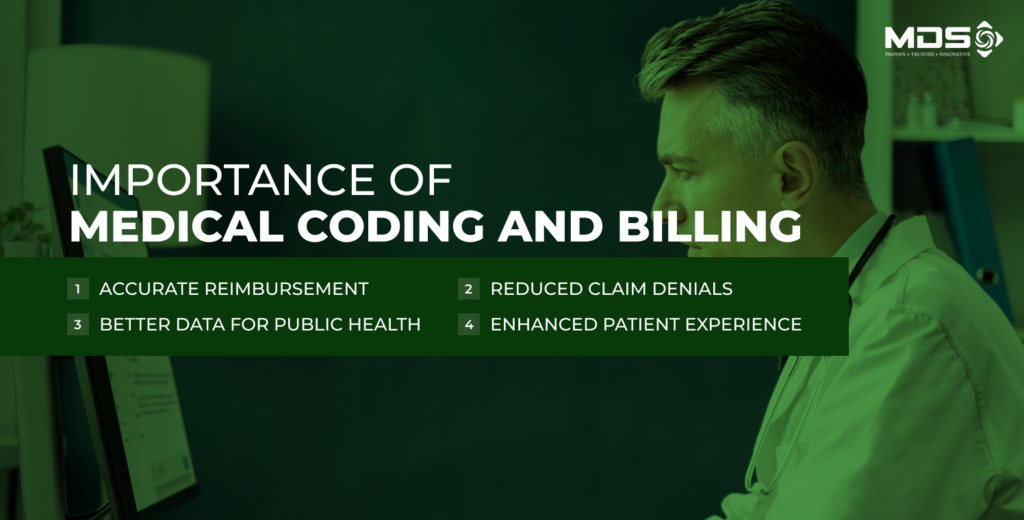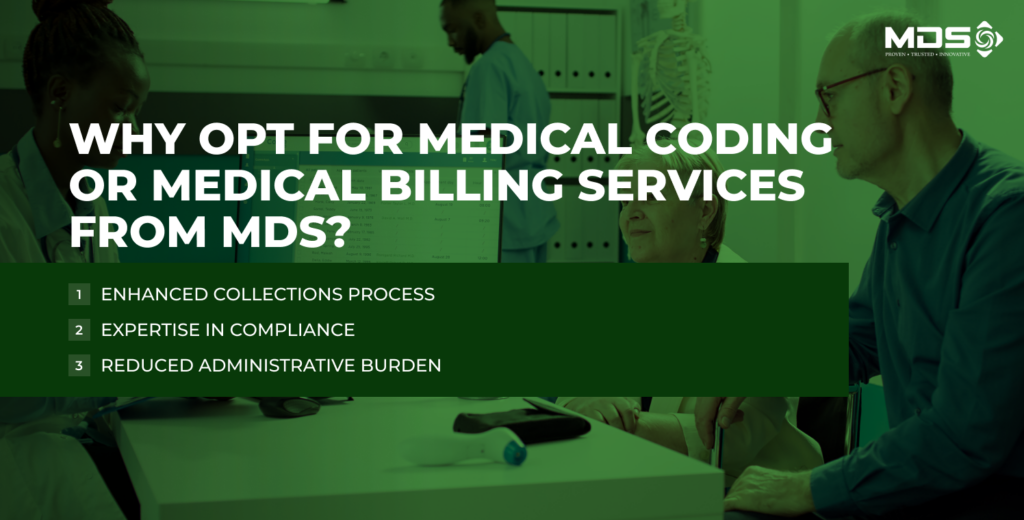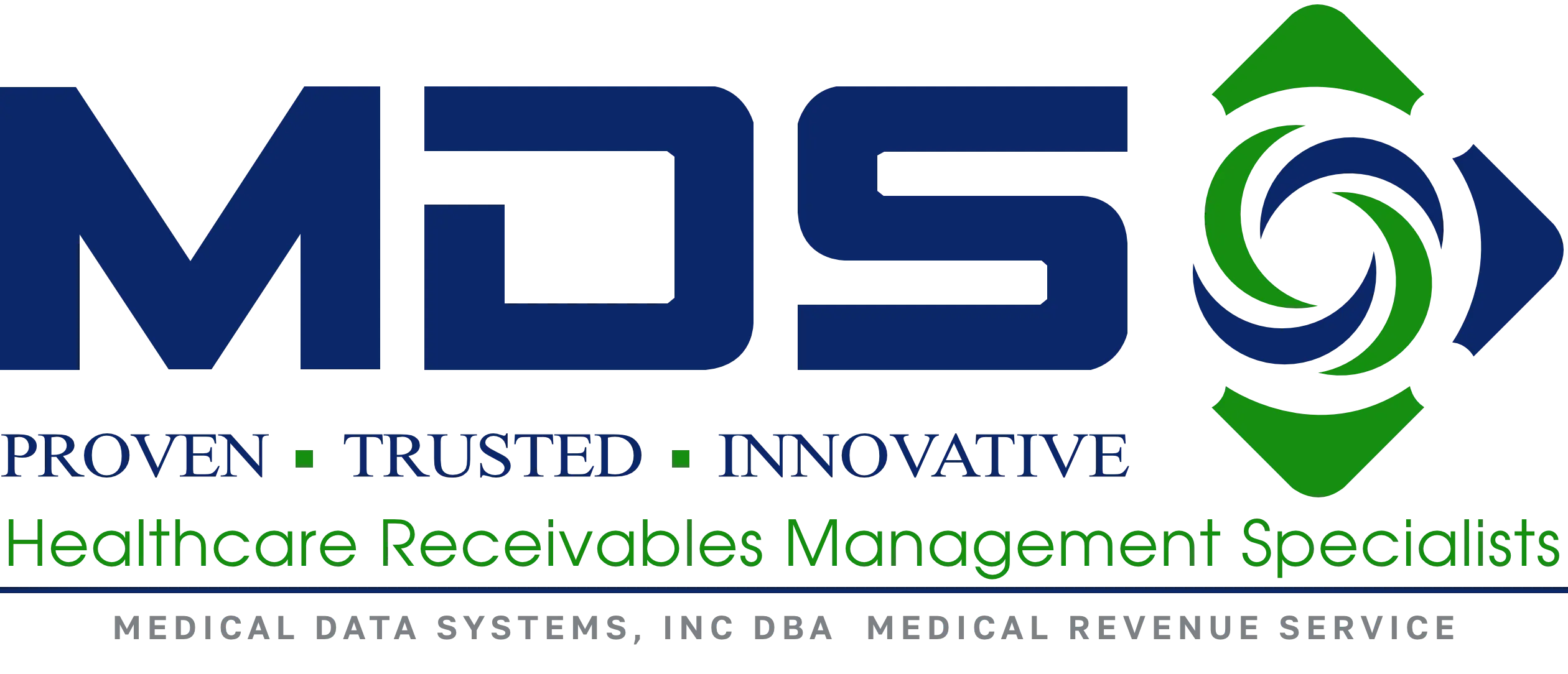If you’ve ever waited for an insurance claim to be processed, you know how complex the billing process can be. As per recent research, it is identified that over 80% of medical bills contain errors. This fact is proven in the U.S. healthcare industry, which is estimated to lose over $125 billion annually due to inefficient billing processes. These losses not only create frustration but also significant revenue reduction for healthcare providers.
In this case, medical coding or medical billing can help! Both these act as a foundation for a smooth healthcare revenue cycle, affecting everything from accurate insurance claims to timely patient billing. When these processes run efficiently, they support better financial health for both healthcare providers and patients. Given their importance, let’s understand their functions and unique impact on the healthcare revenue cycle.
What is Medical Coding and Billing?
The most common terms in a revenue management system are ‘Medical coding,’ and ‘Medical Billing.’ Both these together form the backbone of a smooth healthcare revenue cycle. Generally, medical coding offers the language, while medical billing facilitates the transaction.
To understand what is medical coding and billing in more detail, scroll below.
Medical Coding
Medical coding is the process of translating healthcare diagnoses, procedures, services, and equipment into standardized codes. These codes, like the International Classification of Diseases (ICD), Current Procedural Terminology (CPT), and Healthcare Common Procedure Coding System (HCPCS), are used to convert medical details into a universal language that payers understand. Through this coding, insurance companies can process claims quickly and accurately.
The main purpose of medical coding is to simplify data analysis for healthcare facilities without affecting their revenue cycle. Using precise coding, healthcare facilities can avoid delays or denials in reimbursements, ultimately protecting their revenue cycle.
Medical Billing
Medical billing, on the other hand, is the process of submitting and following up on claims with health insurance companies to receive payment for services rendered. Billers use the codes provided by medical coders to create a bill or claim. This process involves calculating charges, submitting claims, following up on denials, and ensuring patient billing statements are accurate. Then, these claims are verified to be accurate, free from errors, and compliant with payer guidelines to avoid rejections and expedite reimbursement.
The main purpose of medical billing is to ensure healthcare providers are compensated for their services. It aims to secure timely payments from both insurance providers and patients, helping to maintain the financial stability of healthcare organizations.
Hence, together, medical billing and coding form the standard base of the healthcare revenue cycle, supporting efficient, fair, and timely payments for services provided.
Importance of Medical Coding and Billing

Medical billing or coding are both indispensable for healthcare providers looking to maintain an efficient revenue cycle. Here are a few reasons why they’re so important:
- Accurate Reimbursement
Medical billing or medical coding ensures healthcare providers are paid fairly and promptly. Accurate codes are essential for insurance companies to recognize the specific services rendered. This also reduces errors that can lead to claim denials, ensuring faster and authorize reliable reimbursement for healthcare providers.
- Reduced Claim Denials
A claim with errors or discrepancies can delay payment or be denied altogether. Coders and billers help reduce these errors by ensuring accuracy, which translates into fewer rejections, faster payments, and reduced strain on providers’ finances. This also enables healthcare facilities to stay compliant with regulatory standards, as incorrect coding can lead to audits, fines, and legal issues.
- Better Data for Public Health
The coded data allows healthcare administrators and government agencies to analyze trends, improve patient care, and make data-driven decisions on healthcare policy. This leads to a steady cash flow, which is critical for any healthcare provider to operate smoothly and invest in quality patient care.
- Enhanced Patient Experience
For patients, a smooth billing process means fewer surprise bills and improved clarity in understanding their healthcare expenses. Moreover, accurate billing helps prevent unexpected patient costs, improving their experience and trust in the healthcare system.
| Situational Thought Suppose a hospital miscodes a patient’s surgery. Not only could this delay payment from the insurance provider, but it could also lead to out-of-pocket costs for the patient, impacting the patient experience and damaging the healthcare provider’s reputation. |
Key Difference Between Medical Billing and Coding
While medical billing and coding work hand-in-hand, they serve distinct functions within the healthcare revenue cycle. Let’s take a glance to understand the exact difference between medical billing and coding.
| Aspect | Medical Billing | Medical Coding |
| Primary Goal | Ensure timely reimbursement | Ensure accurate documentation of services |
| Function | Prepares and submits insurance claims for payment | Assign standardized codes to patient diagnoses and services |
| Role in Revenue Cycle | Directly responsible for generating invoices and handling payments | Supports accurate claims processing through proper coding |
| Work Environment | Works closely with insurance providers and patients | Commonly works in the back office or remotely |
| Skill Set Needed | Knowledge of insurance regulations, claims processing | Knowledge of coding systems, medical terminology |
| Tools | Billing software, Claims processing | ICD-10, CPT, HCPCS |
| Who Uses It? | Healthcare providers, billers, medical practices, insurance firms | Hospitals, clinics, coders, insurance companies |
| Future Prospects | Growing demand as healthcare costs increase | High demand for accuracy in billing and reporting |
Tip: While both share the same goal, efficient healthcare revenue management of billing and coding represent two different sides of the financial cycle, each with unique demands and benefits.
Medical Billing Vs. Medical Coding: Which Should You Choose?
As healthcare continues to grow, both medical billing and coding are expected to see a significant demand increase, with the Bureau of Labor Statistics projecting an 8% growth for health information technicians, including medical coders, by 2030. Hence, this growth is much faster than the average for other occupations.
Further, with advancements in digital health records and telemedicine, the need for specialized billing and coding professionals will likely keep growing. Coding may require a deeper understanding of medical terminology and coding standards, while billing demands knowledge of insurance regulations and patient interactions. Both fields offer stable careers, but coding tends to have slightly higher pay and specialization options.
Therefore, in terms of job stability, both fields are equally dependable. Medical billing might offer more opportunities for direct patient interaction and work with insurance providers. However, coding focuses more on data accuracy and requires less face-to-face communication. Ultimately, reliability depends on the individual’s preference for administrative or technical work.
Why Opt For Medical Coding Or Medical Billing Services From MDS?

Medical billing and coding may be distinct roles, but they are interdependent and form the backbone of the healthcare revenue cycle. For individuals entering the field, understanding the differences and future potential of each role is vital for making an informed decision.
Outsourcing medical billing and coding in this gen can be a game-changer for healthcare providers, allowing them to focus on what matters most, i.e., patient care. Here’s why Medical Data Systems, a trusted medical debt collection agency, is a smart choice:
- Enhanced Collections Process
With decades of experience, Medical Data Systems has refined its approach to reduce outstanding medical debt, offering a reliable solution to manage healthcare revenue cycles. From handling complex claims to managing patient billing inquiries, we take care of financial stability overall.
- Expertise in Compliance
In an industry where compliance is key, Medical Data Systems offers assurance that your practice stays updated with the latest billing regulations. We also employ trained experts who stay updated on the latest coding regulations and insurance requirements.
- Reduced Administrative Burden
Outsourcing billing and coding tasks to professionals reduces the burden on in-house staff, leading to quicker claim processing and fewer denials. We take care of the intricate billing and coding tasks so healthcare providers can focus more on patient care.
So, whether you’re looking to organize your in-house billing operations or need a comprehensive billing and coding solution, partnering with a professional like us at Medical Data Systems can provide peace of mind. At Medical Data Systems we understand the nuances of billing and coding, which allows for higher accuracy in claims, minimized denials, and optimized revenue flow for healthcare providers. With proven expertise, we ensure smooth claim processing, faster reimbursements, and a healthier practice for providers.
